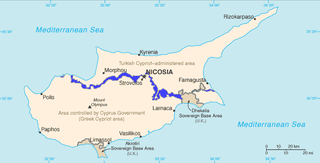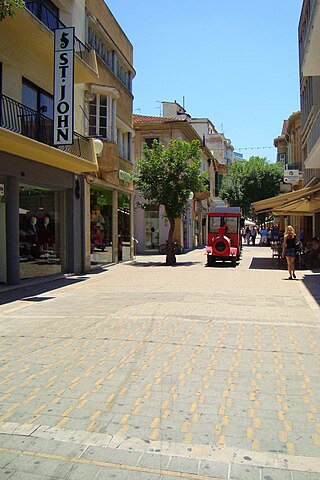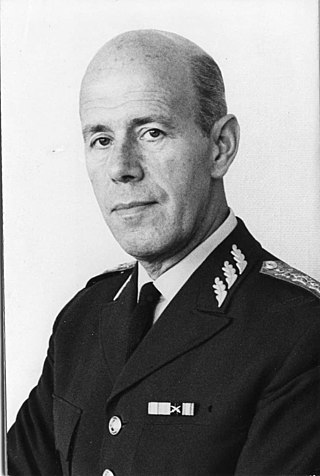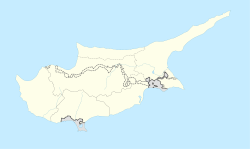
The United Nations Buffer Zone in Cyprus is a demilitarized zone, patrolled by the United Nations Peacekeeping Force in Cyprus (UNFICYP), that was established in 4 March 1964, then extended on 9 August after the Battle of Tillyria and extended again in 1974 after the ceasefire of 16 August 1974, following the Turkish invasion of Cyprus, and the de facto partition of the island into the area controlled by the Republic of Cyprus and the largely unrecognized Turkish Republic of Northern Cyprus in the north. The zone, also known as the Green Line, stretches for 180 kilometres from Paralimni in the east to Kato Pyrgos in the west, where a separate section surrounds Kokkina.

The United Nations Peacekeeping Force in Cyprus (UNFICYP) is a United Nations peacekeeping force that was established under United Nations Security Council Resolution 186 in 1964 to prevent a recurrence of fighting following intercommunal violence between the Greek Cypriots and Turkish Cypriots, to contribute to the maintenance and restoration of law and order and to facilitate a return to normal conditions. Major General Ingrid Gjerde is the current Force Commander of UNFICYP, appointed in 2021, and preceded by Cheryl Pearce (Australia). Assistant Police Commissioner Satu Koivu (Finland) is the current Senior Police Adviser appointed in 2021.

British Forces Cyprus (BFC) is the name given to the British Armed Forces stationed in the UK Sovereign Base Areas of Akrotiri and Dhekelia on the island of Cyprus and at a number of related 'retained sites' in the Republic of Cyprus. The United Kingdom retains a military presence on the island in order to keep a strategic location at the eastern end of the Mediterranean, for use as a staging point for forces sent to locations in the Middle East and Asia. BFC is a tri-service command, with all three services based on the island reporting to it.

Nicosia International Airport is a largely disused airport located 8.2 km (5.1 mi) west of the Cypriot capital city of Nicosia in the Lakatamia suburb. It was originally the main airport for the island, but commercial activity ceased following the Turkish invasion of Cyprus in 1974. The airport site is now mainly used as the headquarters of the United Nations Peacekeeping Force in Cyprus.

Cyprus–India relations are the bilateral relations between the Cyprus and India. India maintains a High Commission in Nicosia. Cyprus maintains a High Commission in New Delhi.

United Nations Security Council resolution 831, adopted on 27 May 1993, after reaffirming Resolution 186 (1964) and all subsequent resolutions on Cyprus, the Council discussed the financial situation surrounding the United Nations Peacekeeping Force in Cyprus (UNFICYP).

United Nations Security Council resolution 1178, adopted unanimously on 29 June 1998, after reaffirming all past resolutions on the situation in Cyprus, the Council extended the mandate of the United Nations Peacekeeping Force in Cyprus (UNFICYP) for a further six months until 31 December 1998.

United Nations Security Council resolution 1331, adopted unanimously on 13 December 2000, after reaffirming all resolutions on the situation in Cyprus, including Resolution 1251 (1999), the Council extended the mandate of the United Nations Peacekeeping Force in Cyprus (UNFICYP) for a further six months until 15 June 2001.
United Nations Security Council resolution 1354, adopted unanimously on 15 June 2001, after reaffirming all resolutions on the situation in Cyprus, including Resolution 1251 (1999), the Council extended the mandate of the United Nations Peacekeeping Force in Cyprus (UNFICYP) for a further six months until 15 December 2001.

United Nations Security Council resolution 1384, adopted unanimously on 14 December 2001, after reaffirming all resolutions on the situation in Cyprus, including Resolution 1251 (1999), the council renewed the mandate of the United Nations Peacekeeping Force in Cyprus (UNFICYP) for a further six months until 15 June 2002.

The United Nations Security Council resolution 1517 was adopted unanimously on 24 November 2003, after reaffirming all resolutions on the situation in Cyprus, particularly Resolution 1251 (1999), the council extended the mandate of the United Nations Peacekeeping Force in Cyprus (UNFICYP) for an additional six months until 15 June 2004.
United Nations Security Council Resolution 1642, adopted unanimously on 14 December 2005, after reaffirming all resolutions on the situation in Cyprus, particularly Resolution 1251 (1999), the council extended the mandate of the United Nations Peacekeeping Force in Cyprus (UNFICYP) for an additional period until 15 June 2006.

United Nations Security Council Resolution 1687, adopted unanimously on June 15, 2006, after reaffirming all resolutions on the situation in Cyprus, particularly Resolution 1251 (1999), the Council extended the mandate of the United Nations Peacekeeping Force in Cyprus (UNFICYP) for six months until December 15, 2006.

United Nations Security Council Resolution 1728, adopted unanimously on December 15, 2006, after reaffirming all resolutions on the situation in Cyprus, particularly Resolution 1251 (1999), the Council extended the mandate of the United Nations Peacekeeping Force in Cyprus (UNFICYP) for six months until June 15, 2007.
Rémy Gorgé was a Swiss national whose career in international peacekeeping with the United Nations spanned more than three decades.

Major General Kristin Lund is a retired senior officer of the Norwegian Army. She was the first woman to command a United Nations peacekeeping operation, serving as Force Commander for the United Nations Peacekeeping Force in Cyprus from 2014 to 2016 and later as Head of Mission/Chief of Staff of the United Nations Truce Supervision Organization from 2017 to 2019.

Lieutenant General Karl Eric Holm was a Swedish Army officer. His senior commands include Chief of the Army Staff and the General Staff Corps (1968–1972), military commander of the Southern Military District (1972–1980) and the Chief of Home Guard (1981–1983).

Operation Snowgoose is the Canadian involvement in the UN peacekeeping mission in Cyprus (UNFICYP). This operation was established in 1964 alongside the UN peacekeeping mission in Cyprus with the goal of reducing tensions between the Greek Cypriot and Turkish Cypriot populations on the island. Canada's participation with UNFICYP was named "Snowgoose" in 1974, and has one of the longest durations of any Canadian peacekeeping operation. Over 33,000 Canadians have served since the beginning of this mission, but currently only one Canadian participates in the operation per year.
Events in the year 1994 in Cyprus.
Major General Cheryl Ann Pearce, is a senior officer in the Australian Army and a former deputy commissioner in the Australian Border Force. She graduated from the Officer Cadet School, Portsea and was commissioned into the Royal Australian Corps of Military Police in 1985. She has commanded the Defence Police Training Centre (2003), 1st Military Police Battalion (2006–08), Task Group Afghanistan (2016) and Australian Defence Force Academy (2017–18). Pearce has served on operations in East Timor and Afghanistan, and was Force Commander, United Nations Peacekeeping Force in Cyprus from January 2019 to January 2021. Pearce retired from full-time service in the army following her return from Cyprus and was appointed Deputy Commissioner Ports and Enforcement in the Australian Border Force in August 2021. She returned to the army in June 2023, on being appointed Deputy Chief of Army. She has been seconded to the United Nations since January 2024, serving as Deputy Military Adviser for Peacekeeping Operations.















